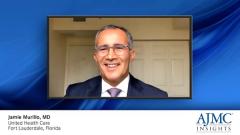
Treatment Goals for Patients With Heart Failure
Expert physicians consider the treatment goals for patients with heart failure.
Episodes in this series

John McMurray, MBChB: When it comes to the aims of treatment for heart failure, whether it’s heart failure with reduced ejection fraction, preserved ejection fraction, or midrange ejection fraction, the goals are really the same. The first goal is to make the patient feel better. Improve their symptoms, or at the very least if you can’t improve their symptoms, stop the progressive worsening that occurs over time. Heart failure is a progressive syndrome, so these patients deteriorate over time. Our first goal is to improve symptoms, and we also want to reduce the risk of admission to the hospital. I have mentioned how common and expensive heart failure hospitalization is, so we want to avoid that if possible. Indeed, more and more, we are refocusing on other manifestations that worsen emergency department visits and other visits to seek urgent care. We want to prevent all those episodes of worsening. Lastly, and in some ways, the hardest thing to improve is survival.
That may be more of a goal for heart failure with reduced ejection fraction, where mortality is particularly high and probably modifiable. That may be less so in patients with heart failure with preserved ejection fraction. In those patients, the mortality rate isn’t quite as high, and when those patients die, they often die from other things, for example, cancer or infections as they are often older patients. They die from what we would describe as noncardiovascular causes, and many of our treatments for heart failure would not reduce the risk of developing and dying from cancer, for example. For this path, the mortality isn’t as important as in the other types of heart failure.
Comorbidity is, of course, a huge problem in heart failure. In fact, the term heart failure is almost synonymous with comorbidity because heart failure is the result of preexisting cardiovascular and sometimes noncardiovascular disease. When patients develop heart failure, that leads to development of other comorbidities. To give you an example of what I mean, 1 of the most common causes of heart failure is coronary artery disease: previous myocardial infarction. A patient develops heart failure, and as a result of developing heart failure, they may go on to develop the atrial fibrillation, for example, with a risk of stroke. They may develop chronic kidney disease. One of the interesting things about heart failure is that it is also a condition that often leads to the development of type 2 diabetes. By definition, almost every patient with heart failure is a multimorbid patient. More and more, our focus of treatment is as much on the comorbidity sometimes as it is on the heart failure itself. For example, it involves the treatment of anemia, which is another common consequence of heart failure, the treatment of chronic kidney disease, the treatment of diabetes, or of course the treatment of coronary disease and atrial fibrillation. All those comorbidities are important parts of the management of heart failure.
The way we treat heart failure is driven by the tremendous evidence base that we have. We’ve gotten that from multiple randomized control trials. Heart failure is 1 of the most evidence-based areas of the whole of medicine vascular cardiology, and all those trials that inform our practice have been distilled into fantastic guidelines that we have. In North America, the American College of Cardiology, American Heart Association, and the Heart Failure Society of America have a joint guideline that’s regularly updated. It is, in many ways, our guide to the way we should manage all these patients. It’s a great distillation of the evidence that we have.
Newsletter
Stay ahead of policy, cost, and value—subscribe to AJMC for expert insights at the intersection of clinical care and health economics.










